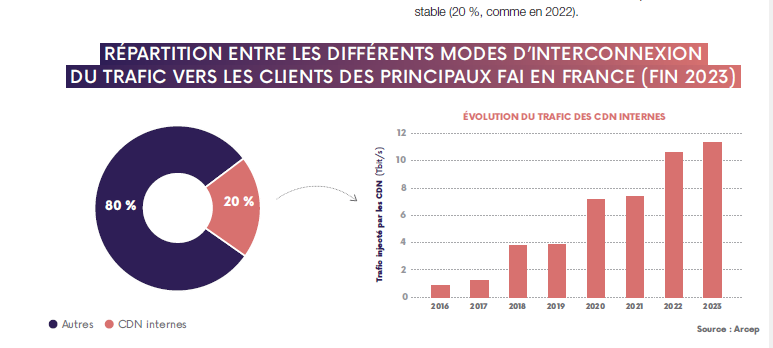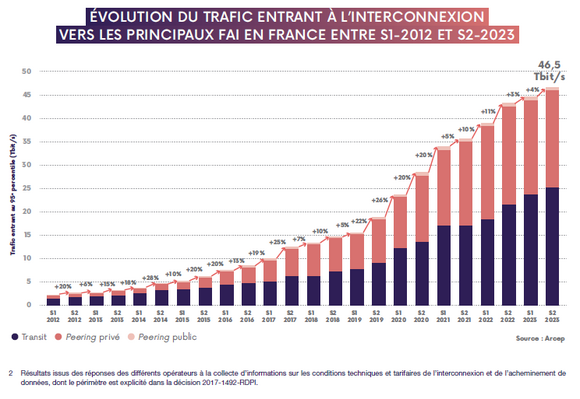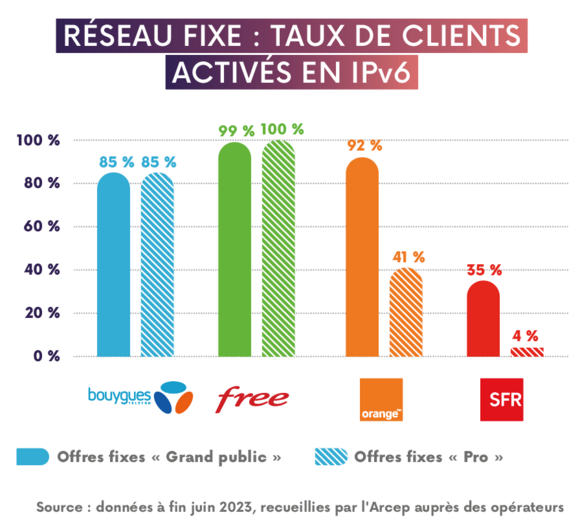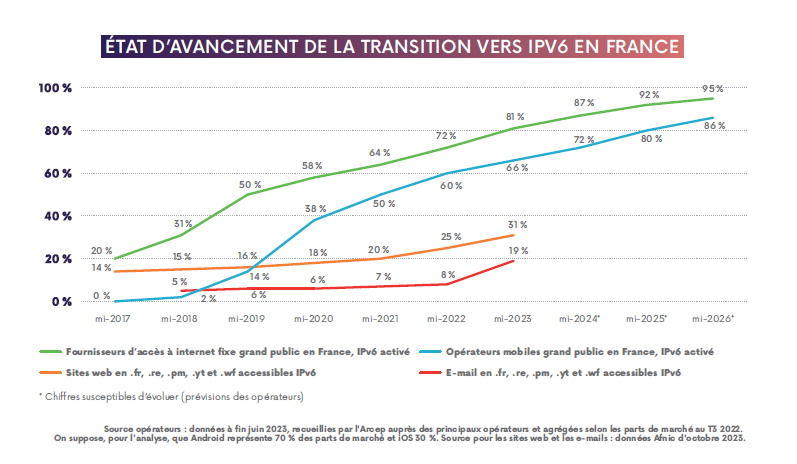Today, Arcep is presenting the 2024 edition of the report on the state of the internet in France. This is Volume 3 of the annual report that the Authority submits to Parliament each year. It provides a detailed account of the actions that Arcep has taken to safeguard the smooth running of the internet, and to ensure that it continues to develop as a common good. It also provides new data thanks to updates of its barometers of data network interconnection and the transition to IPv6. And, for the first time, the report includes a chapter dedicated to AI’s impact on the internet.
Interconnection: inbound traffic continued to increase in 2023… albeit more slowly
At the end of 2023, inbound traffic at IXPs in France is estimated at 46.5 Tbit/s, marking a 7.6% increase compared to 2022 (vs. +21% between the end of 2021 and the end of 2022). Around 53% of this traffic comes from five Big Tech companies: Netflix, Akamai, Facebook, Google, and Amazon[1]. The expansion of cache servers in telecom operators’ on-net content delivery networks(CDN) continues, creating the ability to optimise traffic relayed via interconnection: 20% of inbound traffic to end users is routed via CDNs.

IPv6: ongoing transition to IPv6, with huge disparities within the ecosystem
The transition to IPv6 has become an imperative, to prevent the internet from being split into two: IPv4 on the one side and IPv6 on the other. The Barometer of the transition to IPv6 is updated with data collected by Arcep and Afnic up to the end of 2023. ISPs’ transition to IPv6 continues apace: as mid-2023, 81% of residential fixed access customers (FttH, cable, ADSL) and 66% of mobile customers were enabled, albeit with sizeable disparities between providers. Although web and mail hosting companies still lag behind, they have made real strides, with IPv6-enabled domain names increasing by six points, and IPv6 enabled e-mail addresses doubling over the past year, going from 8% to 19% between mid-2022 and mid-2023.
N.B.: Of the 100 countries with the most internet users, France ranks third in IPv6 adoption, with a combined residential and business adoption rate estimated at 64.6% in April 2024, behind India (71.2%) and Malaysia (65.5%).
Net neutrality: Arcep’s unflagging commitment to safeguarding an open internet
In April 2023, the European Commission published its latest report assessing the implementation of open internet access, and underscoring this regulation’s positive contribution to supporting an open and innovative environment, and protecting users’ rights. In her editorial for this annual report, the Arcep Chair speaks of her profound commitment to Net neutrality, which Arcep continues to safeguard. In 2023, the Wehe traffic prioritisation app – which Arcep makes available to the public as part of its data-driven regulation tools – made it possible for users to run more than 13,000 tests in France, bringing the total to 680,000 since its launch. Reports received on the J’alerte l’Arcep platform created the ability to detect a malfunction between an ISP and a content provider regarding users’ access to e-mails.
Outlook: is generative AI the new internet gateway?
Chatbots, augmented devices, image generators… artificial intelligence applications are proliferating, and in some instances coming to replace the use of veteran online services. What does this mean for users? How will this affect the internet’s openness and the current wealth of available content? For the first time, the report on the state of the internet in France includes a chapter dedicated to the generative AI’s impact on the internet.
A roundtable on 4 July with experts and researchers will provide an opportunity to debate the future of the internet, in the age of generative AI (see inset: “Programme for the report on the state of the internet in France presentation conference, 4 July 2024”).
A column titled “Generative AI threatening our freedom of choice in online content”, by Arcep Chair, Laure de La Raudière, was also published in Le Monde on 2 July.
Cloud computing, data, gatekeeper platforms: major regulatory strides have been made at the European and national levels
Entering into force in May 2024, the Act on safeguarding and regulating cyberspace entrusts Arcep with new regulatory responsibilities, first in the cloud computing market, in preparation for Europe’s Data Act and, second, with respect to data intermediaries, in accordance with the Data Governance Act.
In addition, Arcep is involved in the implementation of the Digital Markets Act within BEREC and is co-chair of the ad hoc working group devoted to the task. Arcep also represents BEREC in the High-Level working group created by the regulation – which has included Arcep co-managing BEREC’s work on instant messaging services’ interoperability obligations, and on the opinion that BEREC issued on the draft reference offer for the interoperability of WhatsApp.
New brick added to the foundation for achieving digital sustainability: the General policy framework for the ecodesign of digital services
Since 17 May 2024, digital sector players have also had access to the General policy framework for the ecodesign of digital services to reduce the environmental footprint of their websites, software, video planforms, AI chatbots, etc. Published by Arcep and Arcom, in concert with ADEME, this document contains 78 factsheets for the development of more eco-friendly services. This voluntary framework, established in collaboration with DINUM, CNIL and Inria, enables stakeholders to deliver an ongoing account of their efforts in the form of an Ecodesign declaration of conformity.
Measuring quality of service: first deployment for the “Access ID card” API by a QoS testing tool
The “Access ID card” API was designed to be installed on ISPs’ home routers to achieve more reliable speed test comparisons. This API provides speed testing tools with information on the internet connection running the test (technology used, headline speed, simultaneous traffic, etc.), thereby enabling them to take those factors into account. All of ISPs’ new routers are now outfitted with this API. In January 2024, Nperf became the first speed test to use the API’s data in its publications.
Associated documents:
- Report on the state of the internet in France 2024
- Barometer of data network interconnection
- Barometer of the transition to IPv6
[1] This percentage includes traffic from Twitch, which is owned by Amazon.
Programme for the State of the internet in France presentation conference, 4 July 2024
9h30 – 10h30: Presentation by Arcep teams of the report on the State of the internet in France, Volume 3 of the Authority’s annual report submitted to Parliament
Opening remarks by Arcep Chair, Laure de La Raudière
Presentation of 2023 highlights (publication of the Ecodesign general policy framework, newfound responsibilities in the cloud and data markets, implementation of the Digital Markets Act) and spotlight on three topics: the interconnection and IPv6 barometers and the latest Open Internet news.
10h30 – 11h30: Roundtable on “Generative AI: the new gateway to online content”
• Célia Zolynski, Law professor, Coordinator of the Université Paris 1 AI Observatory
• Jean Cattan, Secretary-General of the National Digital Council
• Frédéric Alexandre, Director of Research, Mnemosyne team leader at Inria
Moderator: Sandrine Elmi Hersi, Arcep’s “Open Internet” unit chief
A three-volume annual report: three facets of Arcep’s actions
In accordance with the Independent Authorities Act (Loi sur les Autorités administratives indépendantes, AAI) adopted in January 2017, every year Arcep publishes its annual report in three volumes:
Volume 1 “Arcep and regulated markets”, published on 20 June, provides an update on Arcep’s responsibilities, actions and decisions. It also details Arcep’s European and international activities, which have contributed to the construction of European regulation, and the global outreach of French telecoms regulation. See the press release of 20 June 2024.
Volume 2“Regulation in support of connected territories”, which was published on 11 June 2024, is devoted to Arcep’s actions in support of connectivity in the territories. This document is geared to elected officials, local authority representatives, regional State representatives, consumer associations and operators. See the press release of 11 June 2024.
Volume 3 on the State of the internet in France,being published today, 4 July 2024
According to the latest Digital Market Barometer, nine out of 10 people in France use the internet, proof positive of how pervasive the Web has become in our society. This “network of networks” is vital for a host of daily tasks, and it is crucial that it remain a space that respects users’ rights, a purveyor of opportunities and a catalyst for freedom. The widespread use of the internet gives rise to a plethora of technical, legal, economic, and societal issues and challenges. It is against this backdrop that Arcep remains committed to building a safe, open, accessible, and sustainable internet, and to ensuring that it continues to develop as a common good.
This report on the state of the internet in France delivers a detailed account and forward-looking view of Arcep’s activities in this area. It includes contributions from industry luminaries and experts, to flesh out the Authority’s thinking about issues such as privacy, content moderation and regulating the digital sector.
Graphics excerpted from the report on the State of the internet in France:





